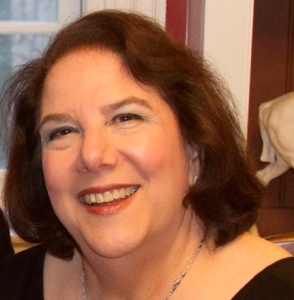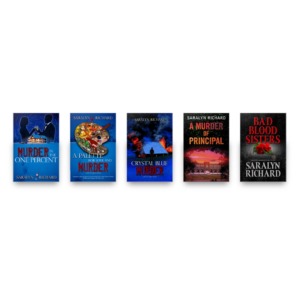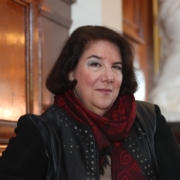Teaching Creative Writing
Teaching Creative Writing
By Saralyn Richard

I always wanted to be an author, but I was sidetracked into teaching by my parents, who felt writing was not a real job. I didn’t mind that much. I loved teaching, too, and when the opportunity arose for me to teach creative writing to high school students, I was in heaven!
I had a slew of very talented and creative youngsters, as well as some who elected to take the class in order to get out of writing a term paper in the more academic English classes. Many of the students took creative writing for two years, so I got to know them well. As a bonus, the creative writing classes were responsible for producing the school’s annual literary magazine. The magazine was technically an extra-curricular activity for first-year students, but the second-year students worked on the publication during class and took editorial roles.
Many of my students became writers or teachers of writing, a fact that continues to thrill me. They remain part of my writing community.
After I left the high school classroom, I started teaching creative writing to senior citizens, ages fifty and older. Our venue was the Osher Lifelong Learning Institute. Most of the learners there had retired from a wide diversity of careers, not writing. They wanted to give writing a try.
Here are some insights I gained from teaching in these different age groups:
| High School | Senior Citizens |
| Had trouble coming up with subjects to write about. | Had so many subjects to write about, hard to pick just one. |
| Target audience was typically narrow, other teens. | Target audience was broad and diverse. |
| Limited in their reading experiences | Extensive reading experiences made for better vocabulary and development of ideas. |
| Harder to find a point of view and voice | Easier to conceptualize POV and voice |
| More imaginative and willing to take risks | More likely to follow traditional patterns of writing |
| More curious and willing to explore new avenues | Less willing to “break the rules” |
| Great storytellers | Great storytellers |

Many of the lessons I taught to both groups were the same: writing with specific details, imagery, figures of speech; dialogue; how to write exposition, narrative, and description; creating characters and settings; point of view; stylistic devices. All of the classes were super-fun, and I learned as much as I taught.
Have you ever taken or taught a creative writing class? What was the most valuable lesson you encountered?
Saralyn Richard is the award-winning author of the Detective Parrott mystery series, BAD BLOOD SISTERS, A MURDER OF PRINCIPAL, and NAUGHTY NANA. Check out her website at saralynrichard.com, and sign up for her monthly newsletter for fun content, contests, and opportunities to connect.


After I left my corporate career in finance, I took creative writing classes and a couple of poetry classes as well. I was shocked and elated when the first story I wrote was published, a story that kept getting anthologized. When I wrote my first novel, I was completely hooked on writing and have found myself wishing, from time to time, that I’d studied creative writing much sooner in life. It’s been a fascinating road to write novels, though I still dabble in poetry from time to time.
Glad you had a great classroom experience. It shows!
I took a few creative writing courses in college and here and there from community offerings, but it wasn’t until I got serious about writing that I took classes that offered different aspects of craft (ex. Guppy SinC chapter courses). Each class, although sometimes intimidating, energized me and made me think. As an older writer, I find your analysis of the teens vs. seniors most interesting – especially after just spending the week at the Left Coast Crime Conference. I’d say most of the writers would be described as middle aged or older.
Do you concur with my analysis, Debra???
I’ve attended writing conferences, taken classes on memoir writing at a nearby art center and had in depth writing lessons with author and developmental editor, Linda Rodrigues. My greatest take away from all classes is that my voice won’t resonate with all but it will with some, so keep writing.
I enjoyed your comparison between youth writers and seniors. In a library writing group i participated in for years, a young woman in her 20s wrote fan fiction full of fantastic scenes and adventures, while women in their 80s were writing their life stories. Weekly writing prompts generated diverse responses from both ends of the spectrum and those in the middle. I learned from all of it.
Thanks for the interesting post!
Glad you enjoyed the post, Barb. 🙂
I give talks on different aspects of writing at libraries and love doing it. The attendees are fabulous.
I’m sure audience members learn a lot from you, Anne.
I’m teaching a 4-part writing workshop to tweens – grades 4 – 8 – in April at my local library. I’ve taught this workshop before and I’m always so pleased and amazed at the complex stories writers this age are able come up with. They’re so smart and engaged. We’re doing a follow-up in October/November . . . encouraging them to do NaNoWriMo Junior . . . so maybe this time I’ll actually get to see some completed stories. I always want to know how their stories end and I don’t always see them again to find out if they finished.
How fun! I didn’t know there was a NaNo junior! Great way to start youngsters off on tapping into their creativity.
Saralynn, I have spoken (wouldn’t necessarily claim to have taught) to middle school children (fourth and sixth graders). I was amazed at how well read they were. I went into these classes with a list of young adult mysteries. They wanted to talk about Stephen King and John Grisham. As part of our discussion I gave them an improvisational exercise. You are absolutely right. They are GREAT storytellers.
How fun! The big name authors wrote middle grade books a few years ago, and they were a huge hit. I’m so glad people are paying attention to what youngsters want and need to read and how they need to express themselves in writing.
Hi Saralyn,
So glad to hear your experience. I’ve been teaching creative writing to middle/high school “critically at-risk” youth for the last five years and remember the first day when I thought I had made a huge mistake. It all got much better, but I notice although I speak to groups fairly often and even do a few filmed interviews, it’s the kids that make me perspire. I can only think that subconsciously I realize that everything I say matters (I don’t always stick to the lessons….) and might make a difference for them. Thank you for what you did and for the students, both the young and the mature ones!
Thank YOU for what you are doing. There are all kinds of lessons to be learned and all kinds of ways to deliver them. The at risk youth are most in need of learning how to express themselves in acceptable ways. What you’re doing is so important.
Thank you for the encouragement!
Like your lucky high school students, I was fortunate to have the same English teacher for all my high school years who focused almost exclusively on creative writing. What a joy it must be for you to have touched so many lives, young and old, for the better.
Thanks for your comment. What would any of us do without great teachers? I had two English teachers who inspired me to write, and one of them is still my dear friend today.
My high school English teacher was amazing. He introduced us to Jane Austen and Homer and so many incredible books. I thanked him in my first published novel and still often think about what a big impact he had on me.
I hope your teacher saw your thanks to him. I had two stellar English teachers in high school. One of them is still reading my work (but not grading it), and she is a dear, dear friend.
I teach adults 18 to 88 and have done so for many years and still do and love it. It’s endlessly gratifying because adults challenge me, give me new perspectives, and keep me enjoying my own writing routine. I love being accountable to my students.